
Brainwashing is the controversial idea that the human mind can be altered or controlled against a person's will by manipulative psychological techniques. Brainwashing is said to reduce its subject's ability to think critically or independently, to allow the introduction of new, unwanted thoughts and ideas into their minds, as well as to change their attitudes, values, and beliefs.
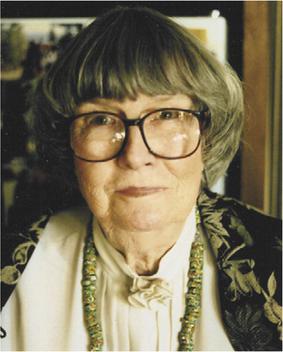
Margaret Thaler Singer was an American clinical psychologist and researcher with her colleague Lyman Wynne on family communication. She was a prominent figure in the study of undue influence in social and religious contexts, and a proponent of the brainwashing theory of cults.
The term large-group awareness training (LGAT) refers to activities—usually offered by groups with links to the human potential movement—which claim to increase self-awareness and to bring about desirable transformations in individuals' personal lives. LGATs are unconventional; they often take place over several days, and may compromise participants' mental wellbeing.

Eileen Vartan Barker is a professor in sociology, an emeritus member of the London School of Economics (LSE), and a consultant to that institution's Centre for the Study of Human Rights. She is the chairperson and founder of the Information Network Focus on Religious Movements (INFORM) and has written studies about cults and new religious movements.

Marshall Herff Applewhite Jr., also known as Do, among other names, was an American religious leader who founded and led the Heaven's Gate new religious movement, and organized their mass suicide in 1997. The suicide is the largest mass suicide to occur inside the U.S.
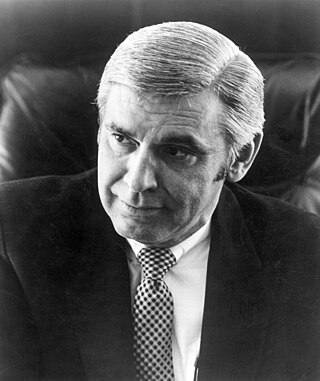
Leo Joseph Ryan Jr. was an American teacher and politician. A member of the Democratic Party, he served as the U.S. representative from California's 11th congressional district from 1973 until his assassination hours before the Jonestown massacre in 1978. Before that, he served in the California State Assembly, representing the state's 27th district.

Steven Alan Hassan is an American mental health professional and author who specializes in the area of cults. He worked as a deprogrammer in the late 1970s, but since then has advocated a non-coercive form of exit counseling.
Cult is a lay term for a group perceived as requiring unwavering devotion to a set of beliefs and practices which are considered deviant outside the norms of society. Such groups are typically perceived as being led by a charismatic leader who tightly controls its members. It is in some contexts a pejorative term, also used for new religious movements and other social groups which are defined by their unusual religious, spiritual, or philosophical beliefs and rituals, or their common interest in a particular person, object, or goal. This sense of the term is weakly defined – having divergent definitions both in popular culture and academia – and has also been an ongoing source of contention among scholars across several fields of study.
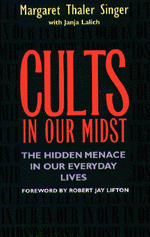
Cults in Our Midst: The Hidden Menace in Our Everyday Lives is a study of cults by Margaret Singer and Janja Lalich, Ph.D., with a foreword by Robert Jay Lifton.

Captive Hearts, Captive Minds: Freedom and Recovery from Cults and Other Abusive Relationships is a study of cults and abusive relationships by Madeleine Landau Tobias, Janja Lalich, and Michael Langone. It was published by Hunter House Publishers in 1994. In 2006, the book was reissued as Take Back Your Life: Recovering from Cults and Abusive Relationships.

Bounded Choice: True Believers and Charismatic Cults is a 2004 psychology and sociology book on cults by Janja Lalich. It was published by University of California Press.
The APA Task Force on Deceptive and Indirect Methods of Persuasion and Control (DIMPAC/DITPACT) was formed at the request of the American Psychological Association (APA) in 1983. The APA asked Margaret Singer, a leading theorist in cults and coercive persuasion, to chair a task force to "expose cult methods and tactics". Some examples that led to the task force's creation were the Manson family murders, Patty Hearst kidnapping, and the Jonestown massacre.

Misunderstanding Cults: Searching for Objectivity in a Controversial Field is an edited volume discussing various topics related to cults, including the scholarly field itself, the concept of brainwashing, and the public perception of the groups. The book was edited by Benjamin Zablocki and Thomas Robbins, and was published by University of Toronto Press on December 1, 2001. It includes contributions from 12 religious, sociological, and psychological scholars, in 14 essays.
Jesse Stephen Miller was a psychologist and psychodynamic psychotherapist.
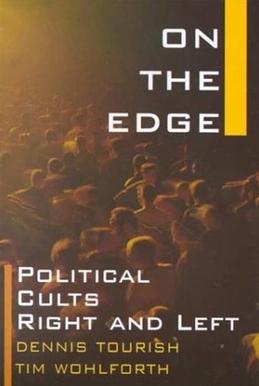
On the Edge: Political Cults Right and Left is a 2000 non-fiction book about political cults, written by Dennis Tourish and Tim Wohlforth.
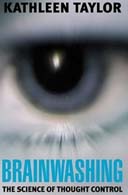
Brainwashing: The Science of Thought Control is a 2004 popular science book explaining mind control, brainwashing, thought reform and coercive persuasion by neuroscientist and physiologist Kathleen Taylor. It explains the neurological basis for reasoning and cognition in the brain, and proposes that the self is changeable, and describes the physiology of neurological pathways. It reviews case studies including Patty Hearst, the Manson Family, and the mass murder/suicide of members of Peoples Temple at Jonestown, and compares the techniques of influence used by cults to those of totalitarian and communist societies. It lays out a model FACET – Freedom, Agency, Complexity, Ends-not-means, and Thinking – which she believes can be used to negate the influence of brainwashing techniques.
The Democratic Workers Party was a United States Marxist–Leninist party based in California headed by former professor Marlene Dixon, lasting from 1974–1987. One member, Janja Lalich, later became a widely cited researcher on cults. Lalich characterized the DWP as a political cult with Dixon serving as its charismatic leader. She estimated that the Democratic Workers Party at one point had 125-150 full-time members and 300-1,000 members with various degrees of affiliation.

Dick Anthony was a forensic psychologist noted for his writings on the validity of brainwashing as a determiner of behavior, a prolific researcher of the social and psychological aspects of involvement in new religious movements.

Seduced: Inside the NXIVM Cult is an American true crime documentary television miniseries revolving around the cult NXIVM and its leader Keith Raniere, with a focus on the perspective of India Oxenberg, who was an executive producer on the series. It consists of four episodes and premiered on October 18, 2020, on Starz.
Twin Flames Universe (TFU) is an American cult run by Jeff and Shaleia Divine. The group's practices, based on elements of New Age spiritualism regarding soulmates popularized in the 2000s, have been criticized as a "self-help and wellness cult" by experts such as Janja Lalich. In 2023, the group was the subject of the documentaries Desperately Seeking Soulmate: Escaping Twin Flames Universe and Escaping Twin Flames.














